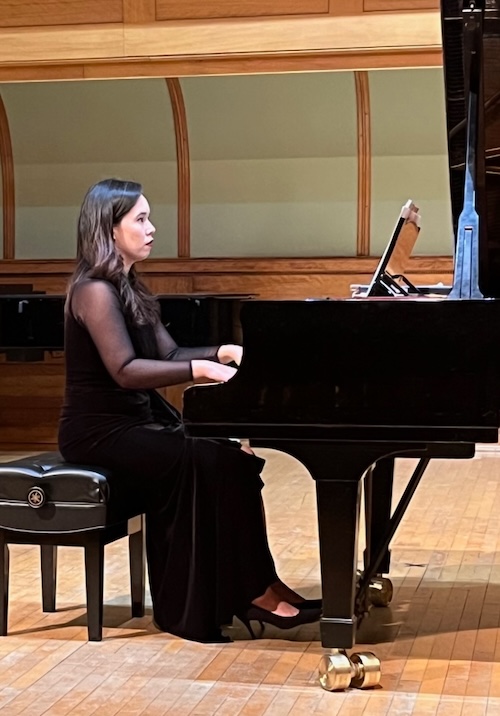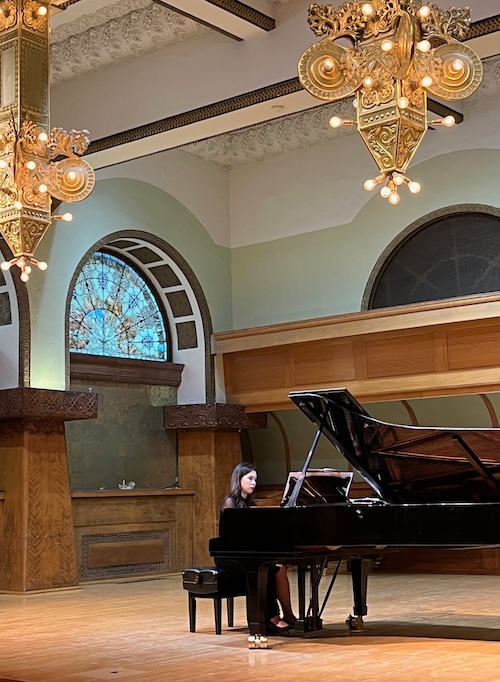Blazing Copland, Kirchner highlight AMP’s 10th anniversary finale

Following successful collaborations with the Kontras Quartet and Illinois Philharmonic Orchestra earlier this year, the American Music Project wrapped its 10th anniversary season Sunday afternoon with a recital from pianist Emiko Edwards at Roosevelt University’s Ganz Hall.
In collaboration with AMP founder Lawrence A. Johnson (editor of this site and its affiliates), Edwards curated a sweeping program that made for an illuminating survey of the last century of American keyboard music, which she performed with intelligence and virtuosity.
Sunday’s performance culminated with the earliest work represented: Copland’s Piano Variations from 1930. This thorny opus is not the composer of Rodeo and Appalachian Spring familiar to most. The through-composed variations center on an austere four-note cell, the barest of material that Copland treats to flights of extravagantly dissonant fantasy in an informal serialist manner.
Copland assembled the Variations from sketches made over several years, though Edwards’ organic performance belied this compositional approach. She shifted seamlessly among Copland’s varied and often brutal moods, unfazed by the knotty complexities. As an encore she offered the composer’s Piano Blues No. 1 from 1947, closing the performance with smokey harmonies but still at the more experimental end of Copland’s output.
Leon Kirchner’s Piano Sonata No. 1, written in 1948 when the composer was in his late 20’s, was the other hefty work on Sunday’s program and closed the first half. Like Copland, Kirchner was Jewish, and while the Sonata No. 1 has no explicit program, given when it was written it is hard not to hear a reflection of the recent horrors of WWII in its pained expression.
Edwards was entirely in sync with Kirchner’s aesthetic. She charted the severe Lento from its stoic opening through later manic flurries, and brought a fragile vulnerability to the chiming Adagio, music that sounds as though it has been devastated by the violence that preceded it. The final Allegro risoluto has the raw aggression of Prokofiev’s War Sonatas, and was dispatched by Edwards with clangorous aplomb.

The balance of Edwards’ program comprised more readily approachable works. Paul Creston’s Six Preludes, Op. 38, is another war period score (1945), but with little of Kirchner’s rage. In a nod to Chopin, Creston here gives aphoristic treatment to single musical ideas, spanning the spectrum from gracious to turbulent. Edwards’ fluent pianism captured the condensed expression of each Creston miniature.
The afternoon opened with Meredith Monk’s Ellis Island, a brief stanza composed in 1981, in which swirling figures evoke lapping water while the harmonies convey a cautious optimism fitting for the storied arrival point of immigrants to this country. Edwards followed this with George Rochberg’s 1966 Nach Bach, an improvisatory ten-minute score that reimagines quotations from Bach’s E Minor Partita amidst clouds of dissonant elaboration, that in Edwards’ dynamic reading made for a heady juxtaposition.
William Grant Still’s A Deserted Plantation is based on a poem of Paul Laurence Dunbar and dates from 1933. Though composed within a few years of Copland’s Variations, Still’s melodic tryptic comes from a different creative universe, and made for an interesting window on the heterogeneous American musical landscape of the interwar period. Edwards imbued the opening “Spiritual” with modal gravitas, though she was overly direct with the innocent lyricism of “Young Missy” and rather stiff in the freewheeling final “Dance,” which calls for greater abandon.
Leo Ornstein’s 1968 Evening’s Sorrow shows the one-time Ukrainian-American enfant terrible in a later, more reflective spirit. In this brief sketch, an opening of wistful simplicity gives way to greater anguish and lush harmonies, though a general sense of solitary rumination prevails, which Edwards deftly captured in her reading.
Jennifer Higdon’s Notes of Gratitude was the only 21st-century work on Sunday’s program. Her 2017 opus alternates between episodes where the pianist mutes the instrument’s strings, producing a plucked effect with interesting resonances, and more spacious, declamatory sentences, all conveying Higdon’s appreciation for pianist Linda Reichert, the first person to offer Higdon a commission. Edwards conjured Higdon’s floating sonorities in an ardent performance that conveyed this sense of heartfelt esteem.
Visit americanmusicproject.net for information on future AMP programs.
Posted in Performances


